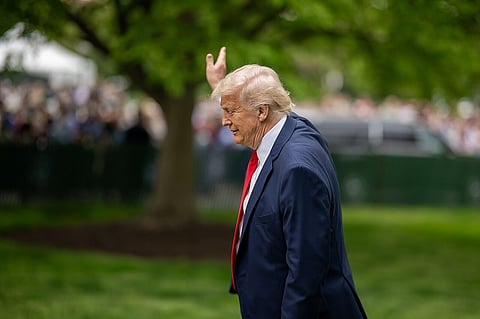

President Donald Trump on Monday accused U.S. courts of obstructing his administration’s efforts to deport migrants, including those allegedly tied to gangs, claiming it would be impossible to hold trials for all individuals facing removal.
The remarks, posted on his social media platform Truth Social, followed a Supreme Court order early Saturday that temporarily halted deportation flights under the Alien Enemies Act—a 1798 law historically invoked during wartime. The administration had sought to use the statute to deport Venezuelan migrants, some of whom were slated to be sent to a prison in El Salvador.
"My team is fantastic, doing an incredible job. However, they are being stymied at every turn—even by the U.S. Supreme Court, which I have great respect for—but which seemingly doesn’t want me to send violent criminals and terrorists back to Venezuela, or any other country, for that matter," Trump wrote.
While the president claimed he was barred from deporting migrants to Venezuela, no court order has explicitly prohibited such removals. Venezuela has, however, previously resisted accepting deportation flights.
Trump asserted that providing trials for all migrants targeted for deportation would be logistically unfeasible, despite legal guarantees of due process for individuals in the U.S., regardless of immigration status.
"We cannot give everyone a trial, because to do so would take—without exaggeration—200 years," he wrote. "We would need hundreds of thousands of trials for the hundreds of thousands of illegals we are sending out of the country. Such a thing is not possible. What a ridiculous situation we are in."
The post appeared partly aimed at critics who argue the administration is bypassing constitutional protections, particularly in the case of Kilmar Abrego Garcia, a Salvadoran man from Maryland who was mistakenly deported earlier this month.
Though the Supreme Court ruled the administration must facilitate Abrego Garcia’s return, Trump officials have refused, releasing documents alleging ties to the MS-13 gang—an accusation largely based on a single confidential informant. Abrego Garcia’s wife had also accused him of domestic abuse, though she later declined to pursue charges.
Sen. Chris Van Hollen (D-Md.), who visited Abrego Garcia in El Salvador last week, condemned the administration’s handling of the case.
"If you deny the constitutional rights of one man, you threaten the constitutional rights and due process for everyone else in America," Van Hollen said on Meet the Press.
Other Venezuelan deportees have faced removal based on disputed evidence, including tattoos misinterpreted as gang symbols. One man was flagged for having "mom" and "dad" inked beneath a crown—a design friends said referenced Three Kings Day celebrations, not the Tren de Aragua gang. Another, a soccer player, bore tattoos honoring Spain’s Real Madrid.
Trump also praised Justice Samuel Alito, who dissented from the Supreme Court’s order, calling the late-night intervention "unprecedented and legally questionable."
"Justice Alito correctly wants to dissolve the pause on deportations. He is right on this!" Trump wrote. "If we don’t get these criminals out of our country, we are not going to have a country any longer."
The Supreme Court has since ruled that deportations under the Alien Enemies Act may proceed only if detainees are afforded due process to challenge their removal. The American Civil Liberties Union had urged the court to intervene, warning that dozens faced deportation without judicial review.